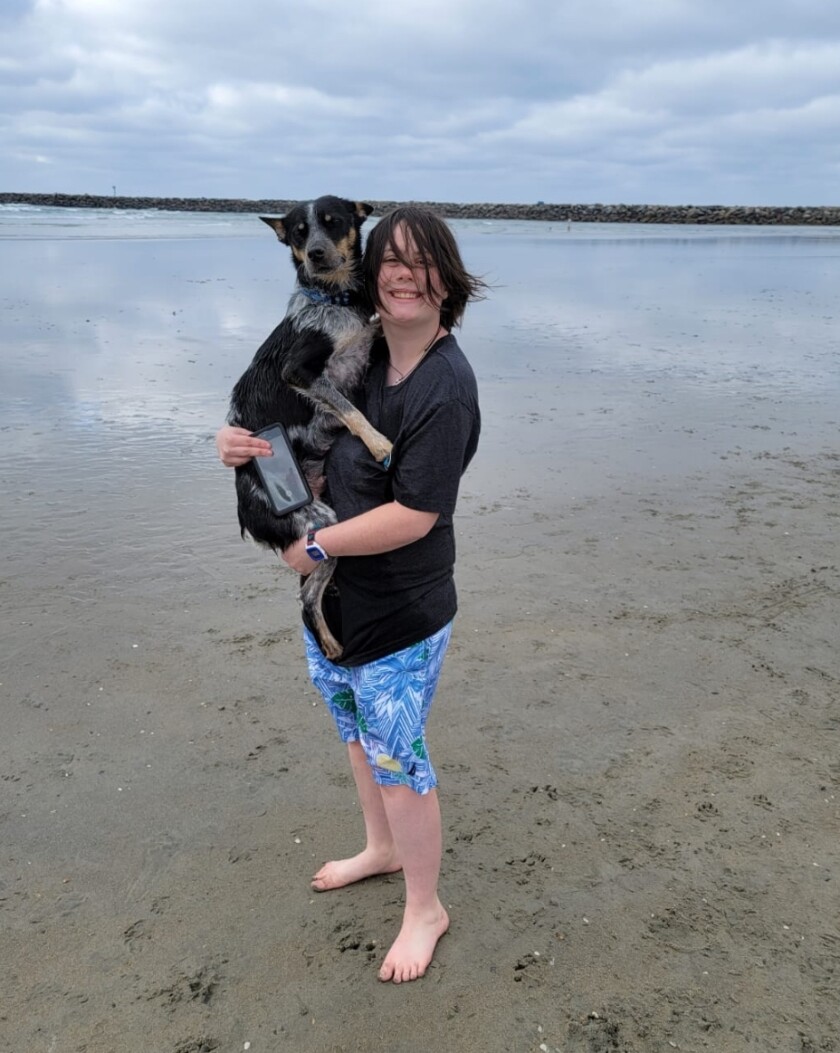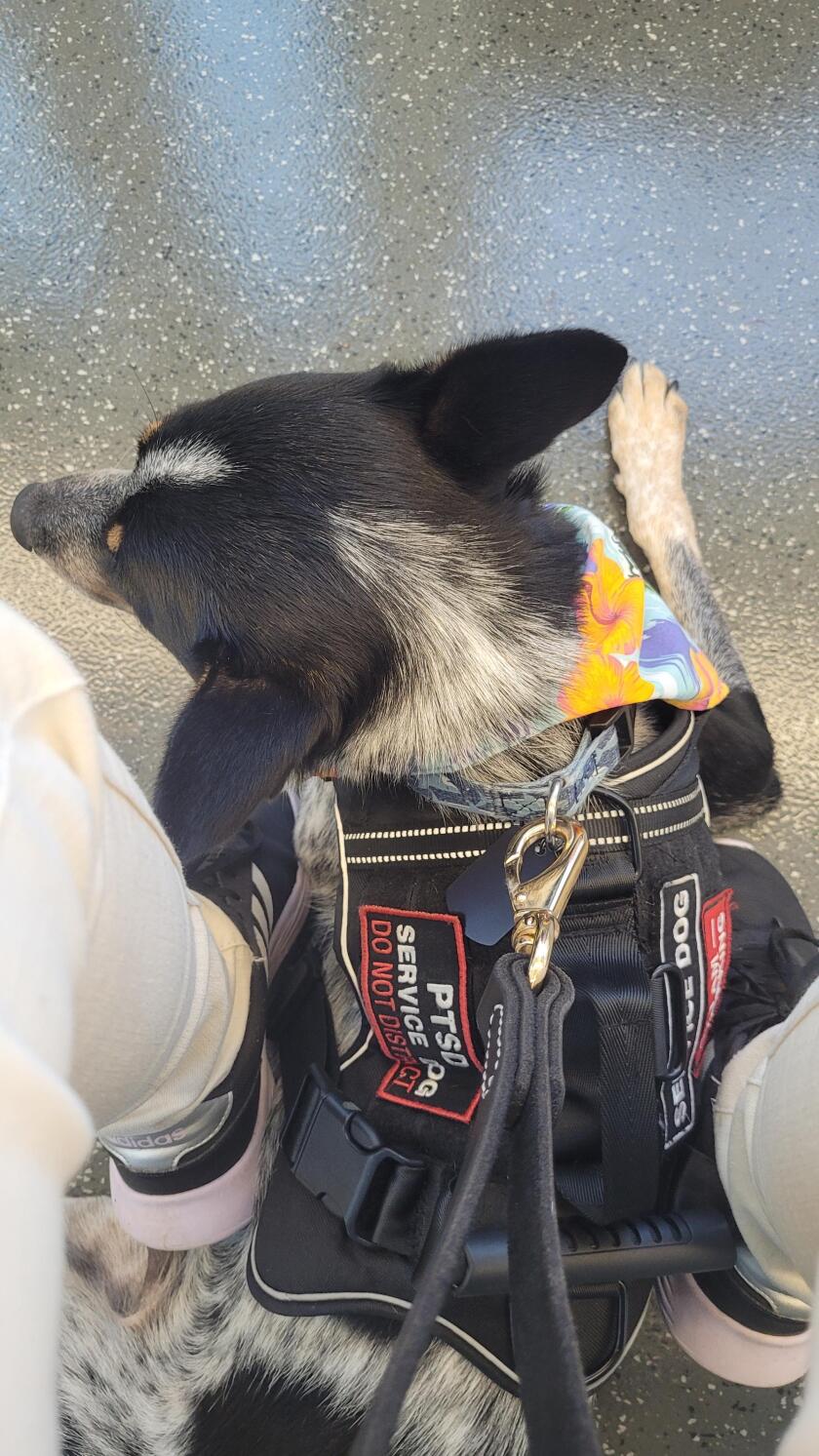Because of her service dog, Meeka, Teresa Perry can do things she wasn’t able to do before. And for that, Perry has nominated Meeka for the American Humane Hero Dog Award.
Meeka is the only dog from San Diego to be selected for the first round of voting in the service dog category (the first round ends Thursday, May 12). If she gathers enough votes to eventually advance to the finals, she and Perry would compete against winners in other categories this fall in Palm Beach, Fla.
Perry, a North Park resident who works at La Jolla Kayak in The Shores, adopted Meeka, an Australian cattle dog, as a rescue about a year ago on the advice of her therapist and psychiatrist to help Perry with her “life-limiting” post-traumatic stress disorder stemming from an experience she is reluctant to talk about.
Meeka wakes Perry every morning, helps her remember to take medication and more.
Newsletter
Get the La Jolla Light weekly in your inbox
News, features and sports about La Jolla, every Thursday for free
You may occasionally receive promotional content from the La Jolla Light.
Meeka’s success as a service dog led Perry to enter her in the Hero Dog contest. “She’s my hero,” Perry said. “Before she came to me, she was in a really bad situation. … She overcame all of that trauma, learned not to be afraid and just live like a normal dog.”
Before Perry came along, Meeka was living in a backyard with little food and no love, Perry said. Perry adopted her from her former owner’s daughter, who saved Meeka from being put to sleep.
She said Meeka’s “overcoming things has shown me that it can be done. … I’m extremely proud of her.”

Teresa Perry, who loves to take Meeka to Ocean Beach’s Dog Beach on their days off, says Meeka is her hero.
(Courtesy of Teresa Perry )
Though Perry adopted Meeka as a rescue, it was clear from the start that Meeka, estimated to be 4 years old, took to learning basic commands well.
“Rescue dogs can become working dogs, too,” Perry said. “The way she always stayed at my side, focused on me, and the way that she was calm even when there was a squirrel or something” made her realize Meeka could be a service dog — one trained to help people who have a disability.
Perry said she has trained Meeka entirely herself, following Americans with Disabilities Act guidelines for service dog training.
She said she first taught Meeka to conduct deep pressure therapy, during which the dog will “either lay across my lap or my chest, and she’ll stay there until I’m ready.”
From there, Meeka learned to “associate my high heart rate with a specific command, which for her is pawing my leg,” Perry said. Within three weeks, Meeka learned how to alert Perry of an oncoming panic attack.
“If she senses that I’m not feeling too good, she will paw at me, which is a signal to me to sit down,” Perry said.
Perry also trained Meeka to “follow” Perry’s husband or a friend to alert them to Perry’s need for help.
“One of her more interesting tasks that I taught her was to bring water to me,” Perry said.
Though Meeka is “not particularly toy-motivated,” she is towel-motivated, Perry said. “So I got a dish towel and … started playing fetch with her with it. After a few weeks of bringing that back, I started [taping the towel] to a water bottle. … Within a week she was bringing it back to me.”

Meeka’s vest shows she is a working service dog.
(Courtesy of Teresa Perry)
Perry said she began to take Meeka out with her when she showed “100 percent focus” on Perry.
Meeka accompanies Perry to stores and other public spaces, and Perry is trying to figure out how to take Meeka to work with her, though a dog doesn’t easily fit into a kayak tour guide’s workday, she said.
Perry hopes to raise awareness about service dogs, saying that people who take emotional-support animals and pets to public places “make it hard for us to work” with service animals.
Pets often are distracted by or aggressive toward other animals, she said. Some people carry fake identification cards to “prove” their animals’ service capacity, when formal cards don’t exist. Identification for service dogs is not required.
Meeka wears a vest to let others know she is working, Perry said, though even that is above the requirements.
Those who want to know if Meeka is an allowable service dog may ask only two questions, Perry said: “Is your animal a service animal?” and “What tasks has the animal been trained to perform?”
“A service dog is not going to be barking, pulling, snapping at people, going up to other dogs,” Perry said. “A true service dog is going to be calm and attentive to their handler.”
Having Meeka in her life means Perry is “able to go out to the grocery store or … socialize and not feel uncomfortable, worrying [about] a panic attack,” she said.
But Meeka is not always working, Perry said. She and her “hero” dog are often at the beach, “one of Meeka’s favorite places to relax.”
To vote for Meeka in the award competition, visit bit.ly/Meeka2022. ◆
